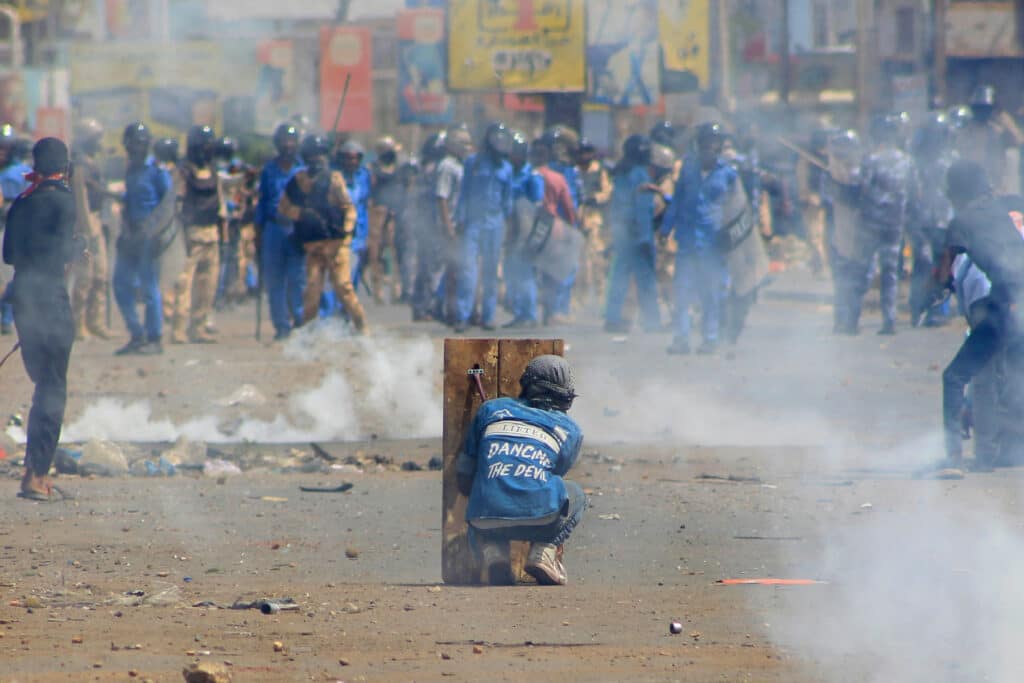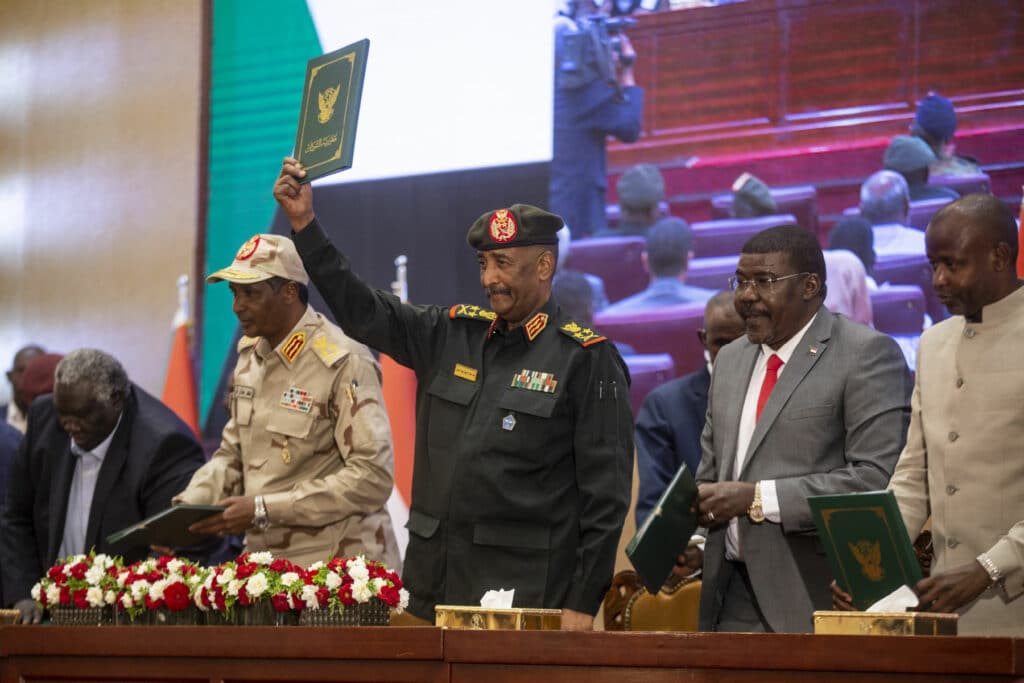Mat Nashed is a journalist and analyst specializing in the Middle East and North Africa, with a focus on Sudan. He has written and reported for Al Jazeera English, TIME, VICE, New Lines, and the Committee to Protect Journalists, among other outlets.
On a hot summer afternoon last July, Hossam Sayyid was driving his motorbike to university in Khartoum when Sudanese security forces cut him off. Officers surrounded the 21-year-old, confiscated his keys and phone, and threw him into a security convoy.
Sayyid, a prominent protester against the 2021 military coup in Sudan, was then taken to a facility controlled by the Central Investigations Department, or CID, in Khartoum. His family wasn't officially informed of his whereabouts for six days. But his mother, Rehab al-Zein, was finally allowed to visit him on July 28.
When she saw her son, he told her "that he was beaten with thick plastic water hoses," she said in an interview with Democracy in Exile. "He was also slapped around on the face."
"At night, they would pour cold water on him and point a flashlight directly into his eyes to terrorize him," al-Zein added.
Sayyid is one of dozens of activists who have been targeted by Sudanese security forces for resisting the military coup that upended the country's frail transition to democracy, following the ouster of dictator Omar al-Bashir in 2019 after 30 years in power.
Like Sayyid, many Sudanese activists have been subjected to enforced disappearances, beaten in incommunicado detention, and questioned about the protest movement. But while most detainees have been released, Sayyid was one of 12 young men accused of killing a member of the security forces. Eight are charged with killing a military intelligence sergeant, while four stand accused of murdering a senior police officer.
Lawyers, diplomats and human rights groups suspect that the charges against the 12 defendants were fabricated to punish prominent anti-coup protesters and to smear the non-violent pro-democracy movement as a security threat, in order to justify the military government's brutal crackdowns.
Written questions and voice notes were sent to Sudan's public prosecutor, Khalifa Ahmed Khalifa, to ask him about the legality of the arrests and the lack of due process in ongoing trials, but he did not respond before publication.
'If I See You on the Street, I Will Shoot You in the Head'

Sayyid is one of the leaders of a protest group called Ghadiboun—which means the "angered people"—known for throwing tear gas canisters back at police after they deliberately fire them into crowds of demonstrators. Both members of Ghadiboun and the resistance committees—neighborhood groups spearheading Sudan's determined protests against the military coup—have been targeted by security forces.
Sayyid was threatened a number of times before his arrest, according to his family. At least two different men claiming to be members of Sudan's security forces sent him messages on Facebook, screenshots of which his family shared with Democracy in Exile. They were trying to scare him into not participating in a major protest planned for June 30, commemorating the third anniversary of the popular uprising against Bashir's regime.
"You will die on the 30th," wrote the first officer, who identified himself as Khalifa al-Helay.
"If I see you on the street, I will shoot you in the head," said the second, who went by the name Mawdda Mohamad.
Lawyers, diplomats and human rights groups suspect that the charges against the 12 defendants were fabricated to punish prominent anti-coup protesters and smear the pro-democracy movement as a security threat.
- Mat Nashed
Mayda al-Kheir, 29, said that her younger brother, Mousab al-Kheir, also received a threatening message on his phone two days before his arrest last August. The sender was anonymous, but Mayda said that the warning was clear: "We won't leave you alone," the message read.
Five months earlier, security forces shot Mousab on the street during a protest, using a hunting rifle that Sudanese authorities typically load with stones, glass and other shrapnel, according to the Central Committee of Sudanese Doctors, a medical union. After undergoing life-saving surgery in Egypt, he returned to Sudan to continue to support anti-coup protests as a member of his neighborhood resistance committee.
Last September, Mousab and Sayyid were among the eight defendants that were charged with killing the military intelligence officer. Prosecutors claim that the officer was beaten to death by a mob of protesters in March 2022.
However, relatives of the accused and their defense lawyers say that witnesses for the prosecution are all members of the security forces who have given inconsistent testimonies that amount to "lies and slander." They added that the accused were intentionally charged with premeditated murder under Article 130 of Sudan's criminal code because the accusation prohibits defendants from going free on bail.
The spokesman for Sudan's army, Nabil Abdallah, declined to respond to accusations that military intelligence officers fabricated charges against the eight defendants. The military, he said in a brief statement, "doesn't comment on ongoing trials."
Torture and Coerced Confessions
In detention, al-Kheir and Sayyid were not interrogated about their alleged role in killing the military officer, according to interviews with their families. Instead, they were severely beaten and intimidated into disclosing information about the protest movement. Sayyid was also offered his freedom in exchange for working as an informant and disclosing the names and whereabouts of his fellow activists, his family said.
In a report released in April, Human Rights Watch found that many Sudanese protesters detained by the CID had similar experiences. The rights group added that security forces had reportedly stripped child detainees naked and threatened sexual violence against women.
Citing their lawyers, Mayda al-Kheir said that "there is not a single shred of evidence tying Mousab with anything" that the authorities are alleging he did. "None of this is legal," she insisted. "He should have been released from detention from the start."
"He was pressured into talking about Ghadiboun," al-Zein said of her son, Sayyid, while he was in detention. "They promised to let him go in a week if he cooperated, but he didn't."
"He refused, and I'm proud of him. I swear I'm proud," she said. "He's the reason that other innocent people weren't brought into the case just so he could go out."
The lack of due process reflects a compromised justice system in Sudan that the coup authorities are weaponizing against critics and opponents.
- Mat Nashed
Other detainees were forced into giving confessions under torture. Mohamad Adam, who is also a member of Ghadiboun, was one of them. In January 2022, Adam was just 17 years old when police abducted him from a hospital while he was being treated for wounds that he sustained during protests. He was then held in incommunicado detention for three weeks and tortured, according to his family and lawyers.
Prison guards hammered a nail into his ankle, tied him upside down and burned him with cigarettes—all to coerce him into to confessing that he killed a senior police officer. Three other young men were charged with the same crime.
Iman Hassan, the lawyer defending all four young men, told Democracy in Exile that Adam had a medical assessment to prove that he was subjected to torture. The examination was carried out by the Council of Doctors, which is an entity tied to Sudan's Ministry of Health. Hassan said that her legal team will submit the medical document to the court as evidence soon. Once she does, she expects the judge to dismiss the case against her clients, since the document proves that security forces violated the U.N. Convention Against Torture, known as UNCAT. That international treaty, which Sudan ratified in August 2021, clearly states that any evidence extracted by torture should not be used as evidence in the court of law, except to incriminate the person accused of torture.
Hassan stressed that the charges against her clients are politically motivated since they were protest leaders. "There were certain officers that were monitoring these young people," said Hassan. "Why? Because these officers were carrying out the orders of the coup government."
Police spokesman Abdallah al-Badri couldn't be reached for comment, despite multiple attempts.
'Leaving Our Revolutionaries in Prison'

On Dec. 5, Sudan's generals and political elites in Khartoum inked a framework agreement to end the military government in power since the coup. However, human rights groups, analysts and protesters all remain highly skeptical that the deal—struck between military leaders and a coalition of political parties in the Forces of Freedom and Change, which formed the civilian side of the former transitional government dissolved in the coup—will restore a genuine transition to democracy.
One key issue is the failure to secure human rights concessions from the coup plotters as part of the agreement. The U.N. envoy to Sudan, Volker Perthes, said in a recent interview with Al-Hurra that human rights and the rule of law would be a higher priority once a civilian government assumes power. For now, he said, the objective is helping Sudan transition to a "fully-fledged civilian government."
Relatives of the 12 young men still languishing behind bars, and their lawyers, told Democracy in Exile that they believe that the international community simply prioritizes the release of high-profile political prisoners over protesters. Many of them pointed to the fact that Wajdi Salih, a leading member of the Sudanese Baath Party, which the Forces for Freedom and Change are trying to convince to back the framework agreement, was released on bail the day that the deal was announced.
While Sayyid, al-Kheir and the other young protesters face trials condemned as shams, it is still unclear how the military intelligence sergeant and police officer died. But the lack of due process reflects a compromised justice system in Sudan that the coup authorities are weaponizing against critics and opponents, as rights groups and defense lawyers have said.
Two Western diplomats, who were not authorized to speak to the media, told Democracy in Exile that they are aware of the two trials. One said that he believes the charges against the 12 defendants are fabricated and that Western embassies are beginning to pay more attention to Adam's case, in particular. The other diplomat said that Western embassies don't have the capacity to closely follow up on every single human rights case.
For many protesters in Sudan, the lack of international support for the 12 defendants epitomizes the failure to champion the demands of the pro-democracy movement. "I do not trust the framework agreement and I do not trust diplomats in general, because they have not paid enough attention to [my son's case]," al-Zein said. "They are only interested in getting their colleagues or employees out of prison, while leaving our revolutionaries in prison."
Editor's note: This article has been updated to correct a later reference to Rehab al-Zein as the mother of Hossam Sayyid, not his sister.







